- Free Tools for Students
- APA Citation Generator

Free APA Citation Generator
Generate citations in APA format quickly and automatically, with MyBib!
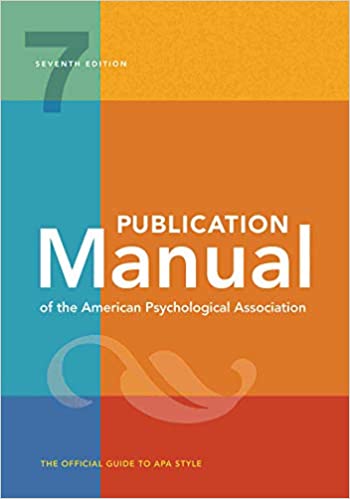
🤔 What is an APA Citation Generator?
An APA citation generator is a software tool that will automatically format academic citations in the American Psychological Association (APA) style.
It will usually request vital details about a source -- like the authors, title, and publish date -- and will output these details with the correct punctuation and layout required by the official APA style guide.
Formatted citations created by a generator can be copied into the bibliography of an academic paper as a way to give credit to the sources referenced in the main body of the paper.
👩🎓 Who uses an APA Citation Generator?
College-level and post-graduate students are most likely to use an APA citation generator, because APA style is the most favored style at these learning levels. Before college, in middle and high school, MLA style is more likely to be used. In other parts of the world styles such as Harvard (UK and Australia) and DIN 1505 (Europe) are used more often.
🙌 Why should I use a Citation Generator?
Like almost every other citation style, APA style can be cryptic and hard to understand when formatting citations. Citations can take an unreasonable amount of time to format manually, and it is easy to accidentally include errors. By using a citation generator to do this work you will:
- Save a considerable amount of time
- Ensure that your citations are consistent and formatted correctly
- Be rewarded with a higher grade
In academia, bibliographies are graded on their accuracy against the official APA rulebook, so it is important for students to ensure their citations are formatted correctly. Special attention should also be given to ensure the entire document (including main body) is structured according to the APA guidelines. Our complete APA format guide has everything you need know to make sure you get it right (including examples and diagrams).
⚙️ How do I use MyBib's APA Citation Generator?
Our APA generator was built with a focus on simplicity and speed. To generate a formatted reference list or bibliography just follow these steps:
- Start by searching for the source you want to cite in the search box at the top of the page.
- MyBib will automatically locate all the required information. If any is missing you can add it yourself.
- Your citation will be generated correctly with the information provided and added to your bibliography.
- Repeat for each citation, then download the formatted list and append it to the end of your paper.
MyBib supports the following for APA style:

Daniel is a qualified librarian, former teacher, and citation expert. He has been contributing to MyBib since 2018.
Scribbr Harvard Referencing Generator
Accurate Harvard references, verified by experts, trusted by millions.
Save hours of repetitive work with Scribbr's Harvard Referencing Generator.
Stop wasting hours figuring out the correct citation format. With Scribbr's referencing generator , you can search for your source by title, URL, ISBN, or DOI and generate accurate Harvard style references in seconds.
Rely on accurate references, verified by experts.
You don’t want points taken off for incorrect referencing. That’s why our referencing experts have invested countless hours perfecting our algorithms. As a result, we’re proud to be recommended by teachers worldwide.
Enjoy the Harvard Referencing Generator with minimal distraction.
Staying focused is already challenging enough. You don’t need video pop-ups and flickering banner ads slowing you down. At Scribbr, we keep distractions to a minimum while also keeping the Harvard Referencing Generator free for everyone.
Referencing Generator features you'll love
Search for your source by title, URL, DOI, ISBN, and more to retrieve the relevant information automatically.
Cite Them Right 12th ed.
Scribbr's Harvard Referencing Generator supports the most commonly used versions: Cite Them Right (12th edition).
Export to Bib(La)TeX
Easily export in BibTeX format and continue working in your favorite LaTeX editor.
Export to Word
Reference list finished? Export to Word with perfect indentation and spacing set up for you.
Sorting, grouping, and filtering
Organize the reference list the way you want: from A to Z, new to old, or grouped by source type.
Save multiple lists
Stay organized by creating a separate reference list for each of your assignments.
Choose between Times New Roman, Arial, Calibri, and more options to match your style.
Industry-standard technology
The Scribbr Referencing Generator is built using the same citation software (CSL) as Mendeley and Zotero, but with an added layer for improved accuracy.
Explanatory tips help you get the details right to ensure accurate citations.
Secure backup
Your work is saved automatically after every change and stored securely in your Scribbr account.
- Introduction
Reference examples
Missing information, citation examples, tools and resources, how to reference in harvard style.
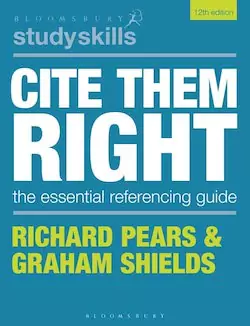
Harvard referencing is a widely used referencing style (especially in UK universities) that includes author-date in-text citations and a complete reference list at the end of the text.
There are many versions of Harvard referencing style. Our guidance reflects the rules laid out in Cite Them Right: The Essential Referencing Guide (12th edition) by Richard Pears and Graham Shields.
Scribbr’s free reference generator can create flawless Harvard style references for a wide variety of sources.
- Cite a webpage
- Cite a book
- Cite a journal article
Harvard reference entries
The reference list appears at the end of your text, listing full information on all the sources you cited. A Harvard reference entry generally mentions the author , date , title , publisher or publication that contains the source, and URL or DOI if relevant.
You’ll include different details depending on the type of source you’re referencing, as some information is only relevant to certain kinds of publications.
The format of a reference entry varies based on source type. Apart from the information included, formatting details such as the use of italics also depend on what you’re referencing. The tabs below show formats and examples for the most commonly referenced source types.
The suggested information won’t necessarily all be available for the source you’re referencing. To learn how to work around missing information in your references, check the table below.
Harvard Referencing Generator
Generate accurate Harvard style references in seconds
Get started
Harvard in-text citations
Harvard referencing style uses author-date in-text citations, which means including the author’s last name and the publication year of the source, like this: (Smith, 2019). This citation points the reader to the corresponding entry in the reference list.
Always include an in-text citation when you quote or paraphrase a source. Include a page number or range when available and relevant to indicate which part of the source you’re drawing on. Using material from other sources without acknowledging them is plagiarism.
In-text citations can be parenthetical (author and date both in parentheses) or narrative (author name mentioned in the sentence, date in parentheses). A source may also have more than one author. If there are four or more, name only the first, followed by “ et al. ”
As with reference entries, it’s good to be aware of how to deal with missing information in your in-text citations.
Scribbr offers a variety of other tools and resources to help with referencing and other aspects of academic writing:
- Referencing generator : Scribbr’s free referencing generator can also create flawless citations in other styles, such as APA and MLA .
- Free plagiarism checker : Detect and fix plagiarism issues with the most accurate plagiarism checker available, powered by Turnitin.
- Proofreading services : Make sure your writing is clear and professional with the help of an expert editor.
- Guide to Harvard style : Understand the rules of Harvard referencing style, and learn how to cite a variety of sources.
- Guides and videos : Explore our Knowledge Base, our YouTube channel, and a wide variety of other educational resources covering topics ranging from language to statistics.
- Plagiarism and grammar
- Citation guides
Citation Machine® — Write Smarter
Start a new citation or manage your existing bibliographies.
Scan your paper for plagiarism and grammar errors.
Check your paper for grammar and plagiarism
Catch plagiarism and grammar mistakes with our paper checker
Use Citation Machine® Plus to get smart recommendations!
Scan your paper for unintentional plagiarism and get advanced recommendations for sentence structure, writing style, grammar and more!
- expert check
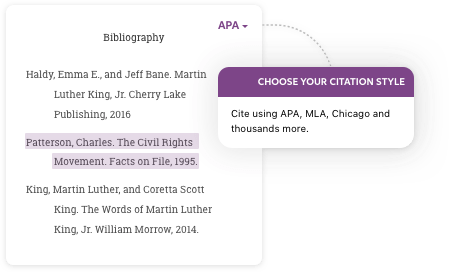
Know you're citing correctly
No matter what citation style you're using (APA, MLA, Chicago, etc.) we'll help you create the right bibliography
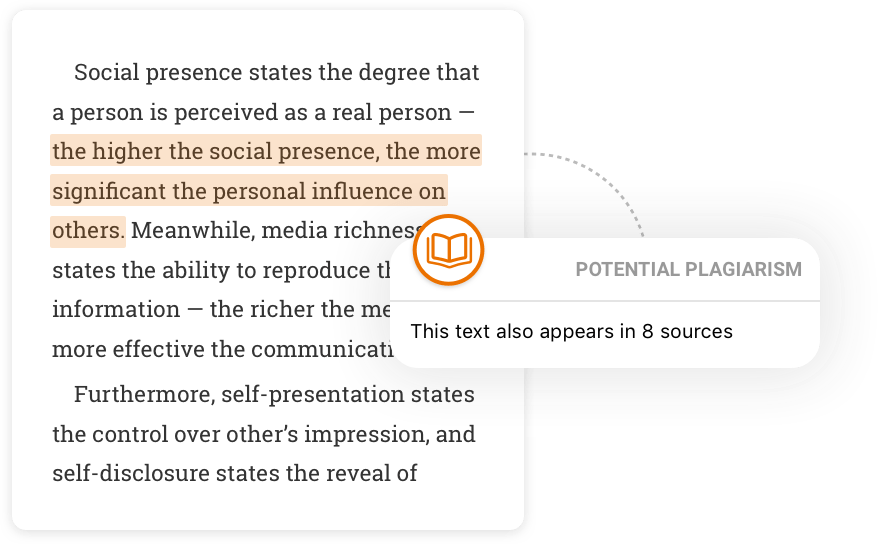
Check for unintentional plagiarism
Scan your paper the way your teacher would to catch unintentional plagiarism. Then, easily add the right citation
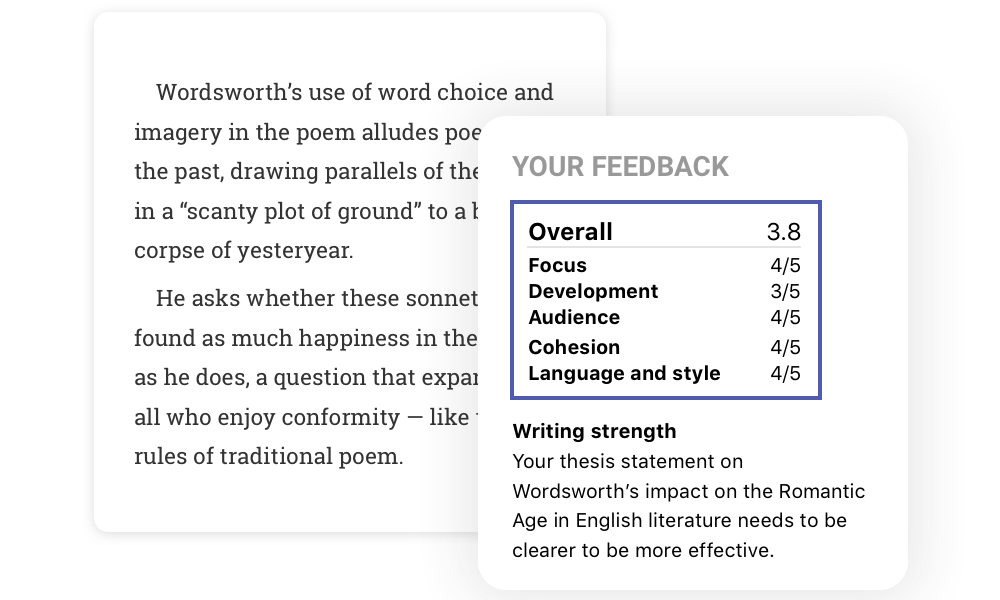
Strengthen your writing
Give your paper an in-depth check. Receive feedback within 24 hours from writing experts on your paper's main idea, structure, conclusion, and more.
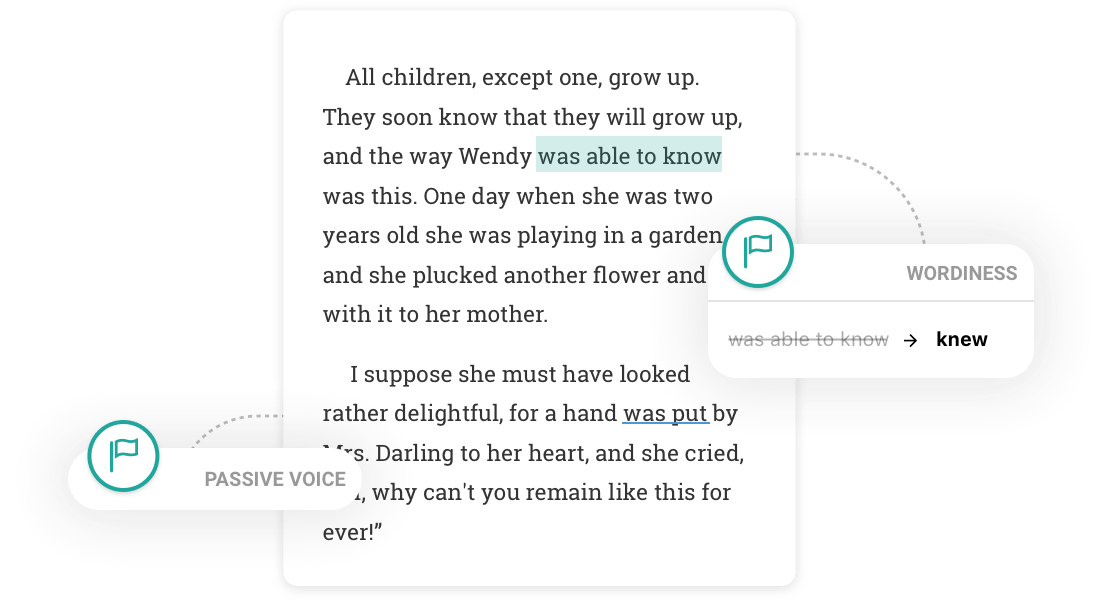
Find and fix grammar errors
Don't give up sweet paper points for small mistakes. Our algorithms flag grammar and writing issues and provide smart suggestions
See what's included with Citation Machine® Plus
Citation machine® guides & resources, mla format: everything you need to know and more.
Filled with a wide variety of examples and visuals, our Citation Machine® MLA guide will help you master the citation process. Learn how to cite websites, books, journal articles, magazines, newspapers, films, social media, and more!
MLA Citation Generator | Website | Books | Journal Articles | YouTube | Images | Movies | Interview | PDFs
Comprehensive Guide to APA Format
Our Citation Machine® APA guide is a one-stop shop for learning how to cite in APA format. Read up on what APA is, or use our citing tools and APA examples to create citations for websites, books, journals, and more!
APA Citation Generator | Website | Books | Journal Articles | YouTube | Images | Movies | Interview | PDFs
Everything You Need to Know About Chicago Style
Creating citations in Chicago style has never been easier thanks to our extensive Citation Machine® Chicago style guide and tools. Learn about footnotes, endnotes, and everything in between, or easily create citations for websites, books, journal articles, and more!
Chicago Citation Generator | Website | Books | Journal Articles | YouTube | Images | Movies | Interview | PDFs
Citation Machine®’s Ultimate Writing Guides
Whether you’re a student, writer, foreign language learner, or simply looking to brush up on your grammar skills, our comprehensive grammar guides provide an extensive overview on over 50 grammar-related topics. Confused about reflexive verbs, demonstrative adjectives, or conjunctive adverbs? Look no further! Learn about these grammar topics and many, many more in our thorough and easy to understand reference guides!
Citing Sources Guide | Grammar Guide | Plagiarism Guide | Writing Tips
Student Blog
Stay up to date! Get research tips and citation information or just enjoy some fun posts from our student blog.
- Citation Machine® Plus
- Citation Guides
- Chicago Style
- Harvard Referencing
- Terms of Use
- Global Privacy Policy
- Cookie Notice
- DO NOT SELL MY INFO
- Human Editing
- Free AI Essay Writer
- AI Outline Generator
- AI Paragraph Generator
- Paragraph Expander
- Essay Expander
- Literature Review Generator
- Research Paper Generator
- Thesis Generator
- Paraphrasing tool
- AI Rewording Tool
- AI Sentence Rewriter
- AI Rephraser
- AI Paragraph Rewriter
- Summarizing Tool
- AI Content Shortener
- Plagiarism Checker
- AI Detector
- AI Essay Checker
- Citation Generator
- Reference Finder
- Book Citation Generator
- Legal Citation Generator
- Journal Citation Generator
- Reference Citation Generator
- Scientific Citation Generator
- Source Citation Generator
- Website Citation Generator
- URL Citation Generator
- Proofreading Service
- Editing Service
- AI Writing Guides
- AI Detection Guides
- Citation Guides
- Grammar Guides
- Paraphrasing Guides
- Plagiarism Guides
- Summary Writing Guides
- STEM Guides
- Humanities Guides
- Language Learning Guides
- Coding Guides
- Top Lists and Recommendations
- AI Detectors
- AI Writing Services
- Coding Homework Help
- Citation Generators
- Editing Websites
- Essay Writing Websites
- Language Learning Websites
- Math Solvers
- Paraphrasers
- Plagiarism Checkers
- Reference Finders
- Spell Checkers
- Summarizers
- Tutoring Websites
Reference Finder by AcademicHelp
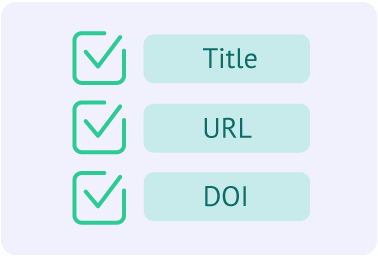
Locate relevant results

Free to use
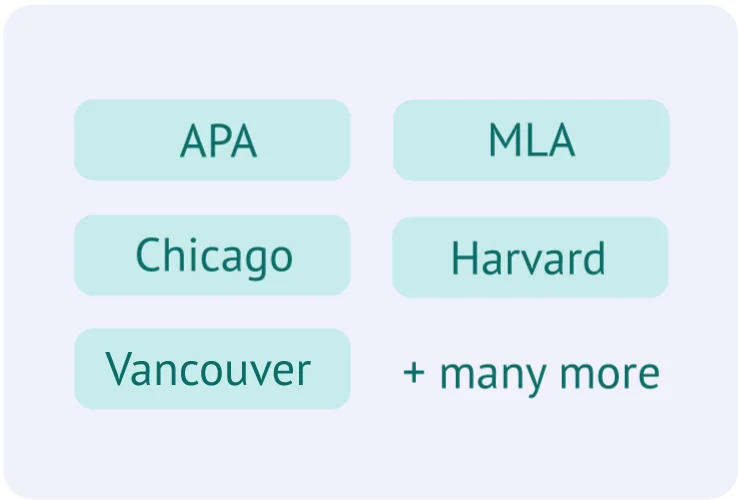
Speed up your research process
Take your referencing to the next level with our source finder tool.
Should you be in search of a cost-free instrument that can elevate your homework writing tasks, you’ve arrived at the ideal destination. Our source finder for essays and research papers is seamlessly integrated with the largest open-access database brimming with officially published academic materials including books, journals, and article collections.
With the help of this AI-powered assistant, you will be spared the hassle of sifting through irrelevant web pages manually. Believe us, we know that you don’t have all that time to spend on useless articles. Get to the essence of scholarly research that was specifically neatly compiled into an easily navigable list.
This is precisely why our citation tool is highly favored not just by students, but by a range of researchers in various fields, such as journalists, content creators, speechwriters, and more.
Accelerating Your Writing with Our Reference Tool
We trained our academic source finder to make it extra assistive. Our system is designed to pinpoint the most relevant resources that support, prove, and add depth to your subject from various perspectives. Whether you’re writing already or haven’t begun yet, this tool proves invaluable in expanding your range of resources.
With our source finder for essays and other types of academic writing, you can also unlock a variety of fresh insights at a click’s reach. Just type in your topic and instantly access a large selection of sources we’ve compiled. Every link is readily available and can be easily downloaded, allowing you to curate a personalized library of resources relevant to your field of study.
An All-Inclusive Citation Finder for In-depth Research
Many students spend hours searching for resources relevant to their papers. And even if they find a good online library, they will still spend valuable time just scrolling the pages trying to find relevant information. Yet time is one of the most valuable resources when you do your research. Our tool offers a solution to the problem of losing precious hours. Thanks to its algorithms it locates the thoughts and references you need just in a few seconds. Enter your topic in our search bar, and access any required citation details.
In contrast to generic search engines that often lead to SEO-driven, sales-focused content, our tool provides direct access to a world of academic sources. Libraries remain a viable option for in-depth research, especially if they specialize in your field. But for immediate inspiration and efficiency, our reference finder is indispensable to ensure the timely completion of your work.
Versatile Citation Formats: APA, MLA, Chicago, and More
Finding the right source is just part of the problem. The other issue is that you have to format that book, article, or whatever, both in the text and in the reference list. And, of course, you need to organize everything according to a specific formatting style.
There are so many requirements for each type of reference though that you can’t possibly keep track of all of them. That would be a real struggle if you had to do everything manually. Thanks to our Reference Finder though, you can save yourself from the formatting hell. Our service provides pre-edited resources, meaning they come arranged according to a specific referencing style. This will save you time and nerves during the writing process, as well as at the stage of editing.
A Reference Finder Tool for High-Quality, Diverse Sources
Our tool offers greater versatility than standard MLA citation finders focused solely on one format. What sets our citation finder apart is its sophisticated algorithm, which is adept at identifying the most relevant and current materials related to your topic. Use it freely to discover new sources and expand your subject matter.
Is there an AI that finds references?
Yes, there is a variety of online tools and software that can help you find references for academic papers, articles, or other research materials. These AI-powered tools often use natural language processing (NLP) and machine learning algorithms to search through available databases and provide relevant citations or sources based on your query or topic. AcademicHelp’s Reference Finder is one of the brightest examples of online platforms that can help you find sources for any type of research.
What is reference finder?
A reference finder is a tool or software that can locate and cite academic sources, such as journal articles, books, conference papers, and sometimes even videos. It can be a separate application or a feature integrated into research databases, library catalogs, or writing software. Reference finders often provide different search options, for example by keywords, author names, or specific titles to help you find the sources you need for your work.
How do I find a specific reference?
To find a specific reference, you can manually google either the name or the author of the work. However, this method doesn’t always work since it is hard to remember such details about every single entry on your reference list. That’s why you can use special software like EndNote, Zotero, or Reference Finder by AcademicHelp, to quickly and easily find and format needed articles, books, research papers, etc.

How do you identify a reference?
You can identify a reference by looking for key elements such as the author(s) who wrote the work, the title of the work (whether it's an article, book, or chapter), the publication date, the source where the work was published (such as the name of the journal or book), and for journal articles, the volume and issue number. Additionally, for articles and book chapters, you should note the range of pages where the work can be found. If the reference is available online, you may also find a Digital Object Identifier (DOI) or a URL.
What website can find references?
Several websites can help you find references for your research. For example, Google Scholar is a freely accessible search engine that indexes scholarly articles, theses, books, and conference papers. PubMed is another free search engine that primarily accesses the MEDLINE database of references and abstracts on life sciences and biomedical topics. Scopus is also good, as it is a multidisciplinary database of peer-reviewed literature. However, note that it is subscription-based. If you are looking for a free solution, that can find any source in seconds and then help you format them properly, then AcademicHelp’s Source Finder is the best fit for you.
Remember Me
What is your profession ? Student Teacher Writer Other
Forgotten Password?
Username or Email

Free Reference Generator
Properly cited paper is your key to success. But referencing is not as easy as 123. There are different formats and different requirements. Luckily, you’ve got a reference generator by Essay.Tools which will do everything automatically. You don’t have to spend hours thoroughly examining each comma and bracket. Just enter the necessary data into the fields below and get the reference you need.
Before you start choose one of the formats (MLA, APA or Chicago) and the type of source you want to cite. The tool will offer you the fields which are necessary to fill in. After you provide the information on the source, you can preview the citation to check it for mistakes and spelling before you click done. Then the citation will be added to the list and you can proceed to the next one. When you finish working with the tool you will have the list of citations formatted according to the academic standards.
1. Select source
2. enter information, 3. view citations, 4. your citations.
- Our Program Divisions
- Our Three Academies
- Government Affairs
- Statement on Diversity and Inclusion
- Our Study Process
- Conflict of Interest Policies and Procedures
- Project Comments and Information
- Read Our Expert Reports and Published Proceedings
- Explore PNAS, the Official Scientific Journal of NAS
- Access Transportation Research Board Publications
- Coronavirus Disease 2019 (COVID-19)
- Diversity, Equity, and Inclusion
- Economic Recovery
- Fellowships and Grants
- Publications by Division
- Division of Behavioral and Social Sciences and Education
- Division on Earth and Life Studies
- Division on Engineering and Physical Sciences
- Gulf Research Program
- Health and Medicine Division
- Policy and Global Affairs Division
- Transportation Research Board
- National Academy of Sciences
- National Academy of Engineering
- National Academy of Medicine
- Publications by Topic
- Agriculture
- Behavioral and Social Sciences
- Biography and Autobiography
- Biology and Life Sciences
- Computers and Information Technology
- Conflict and Security Issues
- Earth Sciences
- Energy and Energy Conservation
- Engineering and Technology
- Environment and Environmental Studies
- Food and Nutrition
- Health and Medicine
- Industry and Labor
- Math, Chemistry, and Physics
- Policy for Science and Technology
- Space and Aeronautics
- Surveys and Statistics
- Transportation and Infrastructure
- Searchable Collections
- New Releases
REFERENCE FINDER
Find relevant information like your own rough draft from among the 12,871 reports available for free at NAP.edu. Copy and paste up to 8 pages of content from some other source: an outside article, a rough draft of your own, etc., then select "Find Relevant Reports".
Find Relevant Reports
Click here to search reports published from the National Academy of Sciences, the Institute of Medicine, the National Academy of Engineering, and the National Research Council.
Build Web Searches
Click here to view key search phrases derived from your content for searching on Google, Yahoo, Bing, and NAP.edu.
The Reference Finder is provided exclusively as a research tool. No information will be retained regarding use of this resource beyond normal server logs. That is, entered text is not retained, and the staff of the National Academies will make no correlations between server logs, IP addresses, and submitted content.
What is the Reference Finder?

Citation widget
Add our smart citation widget to your website in a few easy steps, customize your citation widget:.
Style: MLA Chicago APA
"Page title". Website name. Web. 7 Apr. 2024. <https://your_domain.com>.
Website name. "Page title." Accessed 7 Apr. 2024. https://your_domain.com.
Page title. (n.d.). Website name. Retrieved 7 Apr. 2024, from https://your_domain.com.
About Cite.Me
Send your feedback.
Find academic sources for your next paper
Finish Your Research in Minutes. Save Your Sleep.
Paste your essay to find, summarize, and add credible sources. (That's something Google Scholar can't do!)
200m+ research papers
Precise search filters
Just paste your essay

Join 10,000+ students saving 100s of hours
See Sourcely in action 👇

Please wait. This may take a minute...
If it takes longer than a minute, try again.
Text exceeds 300 characters. Click here to upgrade to SourcelyPRO for unlimited characters
Success: Scroll Down to see results
Publications From
Minimum Citations
Include Keywords
Exclude Keywords
Results for...

Publication Year:
Publication Venue:
Edit your papers with Yomu AI
Seamless Transition from Sources to Masterpiece
Congratulations on finding the perfect sources for your academic paper! Now, take the next step towards crafting a flawless masterpiece with Yomu. Our AI writing assistant is your guide to refined, error-free writing. Edit your paper like a pro with real-time feedback and efficient writing tools. From research to writing, Yomu & Sourcely are your all-in-one solution for academic excellence.
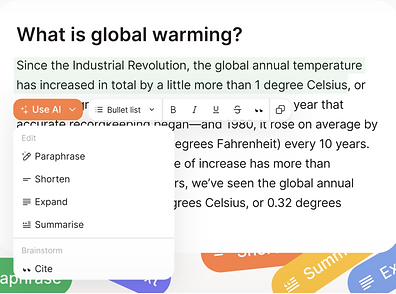
Sources about
Discover more sources for your essay today, sources about .

Trusted By Academics From
Why trust us? Because we are trusted by the absolute best academic institutions, including Harvard, MIT, and Stanford, among others
POWERFUL FEATURES
Fed up with scrolling through pages of search results? Our source-finding tool simplifies the process so you can find your sources quickly and easily.

Paste Your Essay
Simply paste your essay or paragraph and let Sourcely do the rest!

Get Credible Summaries
Save time and effort by quickly getting a general overview/summary of a source material
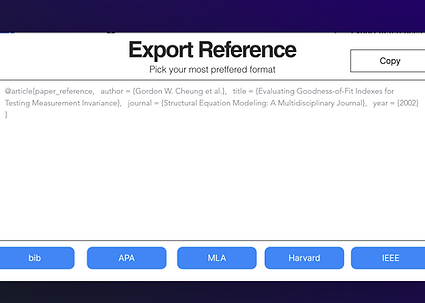.png)
Export References
Save time and ensure accuracy by exporting your sourced references in various formats, making citation and bibliography creation a breeze.
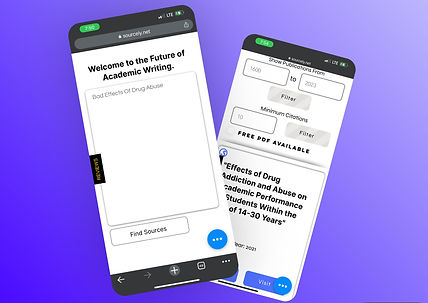_edited.jpg)
F ind Sources
Hit the button, and watch Sourcely find all suitable sources.

Free PDF Downloads
Sourcely also allows users to download free PDFs of many of the sources it lists.
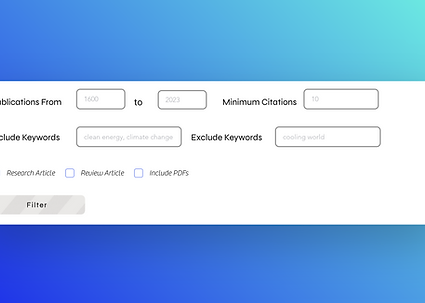.png)
Advanced Filters
Tailor your source discovery by applying advanced filters, such as publication year, authorship, relevance, and more.
PRICING & PLANS
Sourcely is an investment in your academic career, but we know that budgets can be tight. That's why we strive to keep wallet-friendly prices, with monthly plans starting at just $9 per month or yearly plans at $87 - affordable for everyone.
Pay Per Use
Sourcelyfree.
- Skip hours of Manual Research!
- Assured Credibility of Sources
- Only UP TO 300 characters :(
- Quality results for 300 characters
SourcelyPRO Monthly
- Quick and Easy Source-finding
- Ease of Pasting your Entire Essay
- Skip Tedious Manual Research!
- Generate Credible Summaries
- PDF Downloads of Sources
- Search Millions of Sources
- Filter by Year of Publication
SourcelyPRO Yearly
- All features of the Monthly plan
- Save 20% Off the Monthly Plan
- One purchase, endless benefits
- Lock it in before price increases!
- Pro Yearly users suggest features
- Equal to $7.25/month
SourcelyPRO 2000 Words
- Skip tedious Manual Research!
- Total of 2,000 words
Trusted by researchers and organizations around the world
Over 10,000 students, researchers, and industry experts use Sourcely
See what they're saying

10,000 students helped

100,000 hours saved

250,000 sources generated
- How does it work? Our AI algorithms analyze the text and identify key themes and concepts. Then, it searches through our vast data set to find relevant and reliable sources to support those themes. This makes it easy for you to find the information you need to back up your work.
- Who can use it? Our service is perfect for students, researchers, writers, and anyone else who needs to find reliable sources to support their work. It's a great tool for anyone looking to improve the credibility and quality of their writing.
- How much does it cost? We offer a variety of pricing options to fit your needs. We have a free basic plan that is very limited and for the full experience, we have paid versions. Our monthly plan is £4.99 a month, our yearly plan is £29.99/year.
- What makes this service different from others? Unlike other services that simply provide a list of sources, our AI is able to understand the context of your text and find sources that are truly relevant and reliable. Additionally, our data set is the largest in the world, giving you access to more information than any other service.
- Is it easy to use? Yes, our service is very user-friendly. Simply upload your text, and our AI will take care of the rest. You can then easily sort and filter through the sources it finds to find the information you need.
- How quickly can I expect to get the result? Our service is instant, you will get the result as soon as you upload the text.
- How accurate is the service? Our AI is constantly being trained and refined to ensure the highest level of accuracy. We are always working to improve our algorithms to provide you with the most relevant and reliable sources possible.
- Can I use it for any language? Currently, our service supports English language only.
- Is there a customer support? Yes, we have a dedicated customer support team that is available to help you with any questions or issues you may have. You can contact us via email or chat.

Elman Mansimov

Armin Hamrah

Daniel Felix
Software Developer

Welcome to Sourcely! Our AI-powered source finding tool is built by students for students, and this approach allows us to create a tool that truly understands the needs of the academic community. Our student perspective also enables us to stay up-to-date with the latest research and trends, and our collaborative approach ensures that our tool is continually improving and evolving.
Referencing Generator
Powered by chegg.
- Select style:
- Archive material
- Chapter of an edited book
- Conference proceedings
- Dictionary entry
- Dissertation
- DVD, video, or film
- E-book or PDF
- Edited book
- Encyclopedia article
- Government publication
- Music or recording
- Online image or video
- Presentation
- Press release
- Religious text
What is Cite This For Me’s APA Reference Generator?
Cite This For Me’s open-access reference generator is an automated citation machine that turns any of your sources into references in just a click. Using a bibliography generator helps students to integrate referencing into their research and writing routine; turning a time-consuming ordeal into a simple task.
A referencing generator is essentially a citation machine that accesses information from across the web, drawing the relevant information into a fully-formatted bibliography that clearly presents all of the sources that have contributed to your work.
If you don’t know how to reference a website correctly, or have a fast-approaching deadline, Cite This For Me’s accurate and intuitive reference generator will lend you the confidence to realise your full academic potential. In order to get a grade that reflects all your hard work, your references must be accurate and complete. Using a bibliography generator not only saves you time but also ensures that you don’t lose valuable marks on your assignment.
Not sure how to write a bibliography, what in-text referencing is, or just want to find out more about Cite This For Me’s reference generator? This guide outlines everything you need to know to equip yourself with the know-how and confidence to research and cite a wide range of diverse sources in your work.
Why Do I Need To Reference?
Simply put, referencing is the citing of sources used in essays, articles, research, conferences etc. When another source contributes to your work, you have to give the original owner the appropriate credit. After all, you wouldn’t steal someone else’s possessions so why would you steal their ideas?
Regardless of whether you are referencing a website, an article or a podcast, any factual material or ideas you take from another source must be acknowledged in a reference unless it is common knowledge (e.g. The Second World War started in 1939). Failing to credit all of your sources, even when you’ve paraphrased or completely reworded the information, is plagiarism. Plagiarising will result in disciplinary action, which can range from losing precious marks on your assignment to expulsion from your university.
What’s more, attributing your research infuses credibility and authority into your work, both by supporting your own ideas and by demonstrating the breadth of your research. For many students, crediting sources can be a confusing and tedious process, but it’s a surefire way to improve the quality of your work so it’s essential to get it right. Luckily for you, using Cite This For Me’s reference generator makes creating accurate references easier than ever, leaving more time for you to excel in your studies.
In summary, the citing process serves three main functions:
- To validate the statements and conclusions in your work by providing directions to other sound sources that support and verify them.
- To help your readers locate, read and check your sources, as well as establishing their contribution to your work.
- To give credit to the original author and hence avoid committing intellectual property theft (known as ‘plagiarism’ in academia).
How Do I Cite My Sources With The Cite This For Me Referencing Generator?
Cite This For Me’s reference generator is the most accurate citation machine available, so whether you’re not sure how to format in-text referencing or you don’t know how to write a bibliography, this bibliography generator will solve all of your citing needs.
Crediting your source material with a bibliography maker doesn’t just prevent you from losing valuable marks for plagiarism, it also provides all of the information to help your reader find for themselves the book, article, or other item you are citing. The accessible interface of the reference generator makes it easy for you to identify the source you have used – simply enter its unique identifier into the citation machine search bar. If this information is not available you can search for the title or author instead, and then select from the search results that appear below the reference generator.
Don’t know how to reference a website? The good news is that by using tools such as Cite This For Me’s reference generator, which help you work smarter, you don’t need to limit your research to sources that are traditional to cite. In fact, there are no limits to what you can cite with this bibliography maker, whether you want to reference a website, a YouTube video or a tweet.
To use the reference generator, simply:
- Select your style from Harvard, APA and many more*
- Choose the type of source you would like to cite (e.g. website, book, journal, video)
- Enter the URL , DOI , ISBN , title, or other unique source information to find your source
- Click the ‘Cite’ button on the reference generator
- Copy your new citation straight from the referencing generator into your bibliography
- Repeat for each source that has contributed to your work.
*If you require another style for your paper, essay or other academic work, you can select from over 1,000 styles by creating a free Cite This For Me account.
Once you have created your Cite This For Me account you will be able to use the reference generator to create multiple references and save them into a project. Use the highly-rated iOS or Android apps to generate references in a flash with your smartphone camera, export your complete bibliography in one go, and much more.
What Will The Reference Generator Create For Me?
Cite This For Me’s reference generator will create your reference in two parts; an in-text citation and a full reference to be copied straight into your work.
The reference generator will auto-generate the correct formatting for your bibliography and in-text referencing depending on your chosen style. For instance, if you select a parenthetical style to format in-text referencing, the bibliography maker will generate an in-text citation in parentheses along with a full reference to slot into your bibliography. Likewise, if the reference generator is set to a footnote style then it will create a fully-formatted reference for your reference list, as well as a corresponding footnote to insert at the bottom of the page containing the relevant source.
Parenthetical examples:
In-text referencing example: A nation has been defined as an imagined community (Anderson, 2006).* Alternative format: Anderson (2006) defined a nation as an imagined community.
*The reference generator will create your references in the first style, but this should be edited if the author’s name already appears in the text.
Reference list example: Anderson, B. (2006). Imagined Communities. London: Verso.
What Are Citation Styles?
A citation style is a set of rules that you, as an academic writer, must follow to ensure the quality and relevance of your work. There are thousands of styles that are used in different academic institutions around the world, but in Australia the most common are Harvard and APA.
The style you need to use will depend on the preference of your lecturer, discipline or academic institution – so if you’re unsure which style you should be using, consult your department and follow their guidelines exactly, as this is what you’ll be evaluated on when it comes to marking. You can also find your university’s style by logging into your Cite This For Me account and setting your institution in ‘My Profile’.
Citing isn’t just there to guard against plagiarism – presenting your research in a clear and consistent way eases the reader’s comprehension. Each style has a different set of rules for formatting the page, in-text referencing and your reference list. Be sure to adhere to formatting rules such as font type, font size and line spacing to ensure that your work is easily legible. Furthermore, if your work is published as part of an anthology or collected works, each entry will need to be presented in the same style to maintain uniformity throughout. Even when using a citation machine, it is important to make sure that you don’t jump from one style to another, so follow the rules carefully to ensure your reference list and bibliography are both accurate and complete.
If you’re unsure about how to reference and need a hand with your in-text referencing or reference list, why not try Cite This For Me’s reference generator? It’s the quickest and easiest way to cite any source, in any style. The reference generator above will create your citations in the Harvard style as standard, but the bibliography maker can also generate fully-formatted references in over 1,000 styles – including university variations of each style. So, whether your lecturer has asked you to adopt Harvard referencing , or your subject requires you to use APA referencing , AMA or MLA we’re sure to have the style you need. To access each style’s reference generator, simply go to Cite This For Me’s website to create your free Cite This For Me account and search for your specific style.
How Do I Format A Reference List Or Bibliography?
Drawing on a wide range of sources greatly enhances the quality of your work, and reading above and beyond your recommended reading list – and then using these sources to support your own thesis – is an excellent way to impress your reader. As well as in-text referencing, a clearly presented reference list and bibliography demonstrate the lengths you have gone to in researching your chosen topic.
Typically, a reference list starts on a new page at the end of the main body of text and includes a complete list of the sources you have actually cited in your paper. This list should contain all the information needed for the reader to locate the original source of the information, quote or statistic that directly contributed to your work. On the other hand, a bibliography is a comprehensive list of all the material you may have consulted throughout your research and writing process. Both provide the necessary information for readers to retrieve and check the sources cited in your work.
Each style’s guidelines will define the terminology of ‘reference list’ and ‘bibliography’, as well as providing formatting guidelines for font, line spacing and page indentations. In addition, it will instruct you on how to order each list – this will usually be either alphabetical or chronological (meaning the order that these sources appear in your work). Even if you’ve used a bibliography generator, be sure to check that you have formatted your whole paper according to your style’s formatting guidelines before submitting your work.
Sound complicated? Citing has never been so easy. If you don’t know how to write a bibliography, Cite This For Me’s bibliography generator will automatically generate fully-formatted references for your reference list and bibliography in your chosen style. Sign in to your Cite This For Me account to save and export your bibliography.
How Do References Actually Work?
Although the bibliography maker will cite your sources for you in record time, it is still useful to understand how a reference generator works behind the scenes. Understanding how a citation machine actually generates references will greatly increase the quality of your work.
As well as saving you time with its referencing generator, Cite This For Me provides the learning resources to help you fully understand the citing process and the benefits of adopting great referencing standards.
The referencing process:
- Find a book, journal, website or other source that will contribute to your work
- Save the quote, image, data or other information that you will use in your work
- Save the source information that enables you to find it again (i.e. URL, ISBN, DOI etc.)
- Format the source information into a reference
- Copy and paste the citation into the body of the text
- Export or copy and paste the fully-formatted reference into your bibliography
- Repeat for each source that contributes to your work
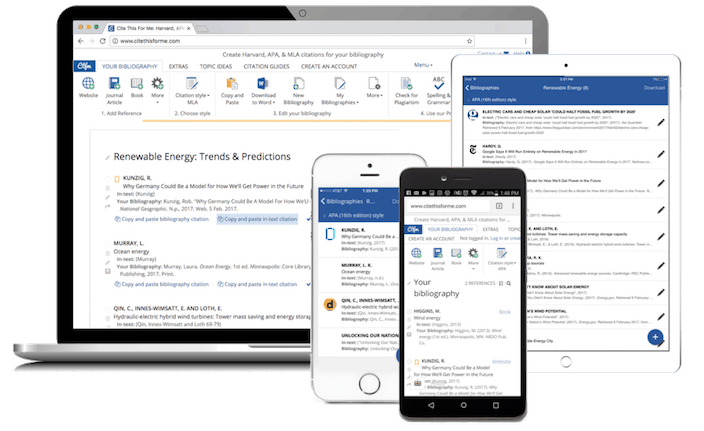
Manage all your references in one place
Create projects, add notes, cite directly from the browser and scan books’ barcodes with a mobile app.
Sign up to Cite This For Me – the ultimate reference management tool.
Have a language expert improve your writing
Run a free plagiarism check in 10 minutes, generate accurate citations for free.
- Knowledge Base
- Working with sources
How to Find Sources | Scholarly Articles, Books, Etc.
Published on June 13, 2022 by Eoghan Ryan . Revised on May 31, 2023.
It’s important to know how to find relevant sources when writing a research paper , literature review , or systematic review .
The types of sources you need will depend on the stage you are at in the research process , but all sources that you use should be credible , up to date, and relevant to your research topic.
There are three main places to look for sources to use in your research:
Research databases
- Your institution’s library
- Other online resources
Table of contents
Library resources, other online sources, other interesting articles, frequently asked questions about finding sources.
You can search for scholarly sources online using databases and search engines like Google Scholar . These provide a range of search functions that can help you to find the most relevant sources.
If you are searching for a specific article or book, include the title or the author’s name. Alternatively, if you’re just looking for sources related to your research problem , you can search using keywords. In this case, it’s important to have a clear understanding of the scope of your project and of the most relevant keywords.
Databases can be general (interdisciplinary) or subject-specific.
- You can use subject-specific databases to ensure that the results are relevant to your field.
- When using a general database or search engine, you can still filter results by selecting specific subjects or disciplines.
Example: JSTOR discipline search filter
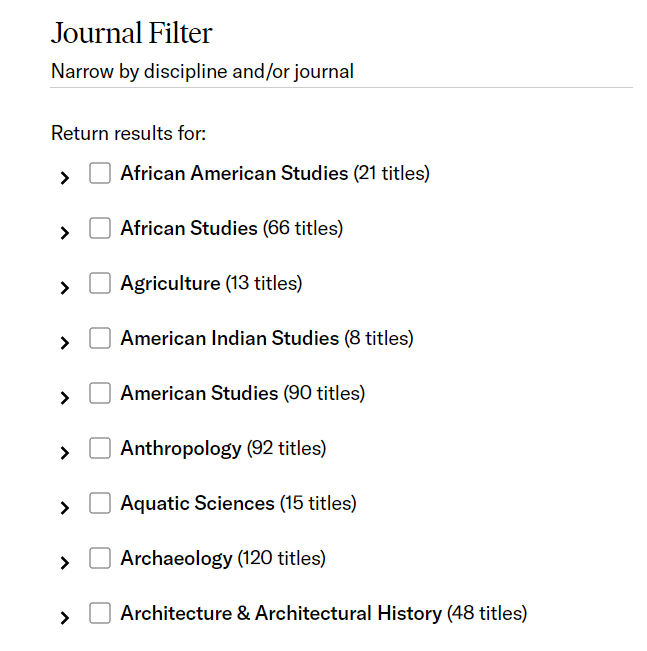
Check the table below to find a database that’s relevant to your research.
Google Scholar
To get started, you might also try Google Scholar , an academic search engine that can help you find relevant books and articles. Its “Cited by” function lets you see the number of times a source has been cited. This can tell you something about a source’s credibility and importance to the field.
Example: Google Scholar “Cited by” function

Boolean operators
Boolean operators can also help to narrow or expand your search.
Boolean operators are words and symbols like AND , OR , and NOT that you can use to include or exclude keywords to refine your results. For example, a search for “Nietzsche NOT nihilism” will provide results that include the word “Nietzsche” but exclude results that contain the word “nihilism.”
Many databases and search engines have an advanced search function that allows you to refine results in a similar way without typing the Boolean operators manually.
Example: Project Muse advanced search
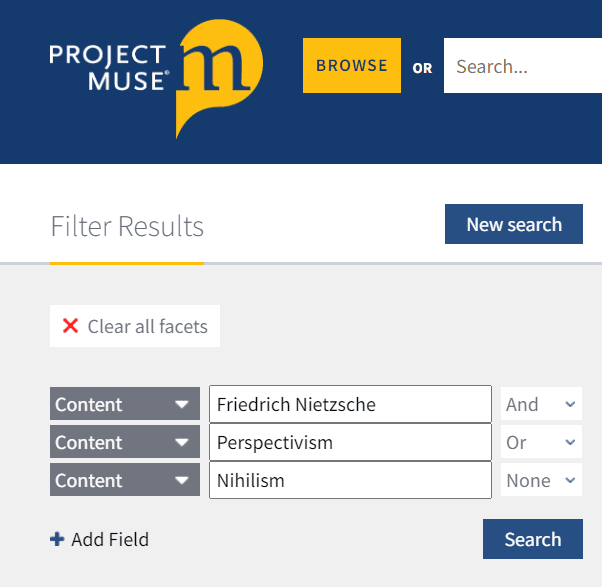
The only proofreading tool specialized in correcting academic writing - try for free!
The academic proofreading tool has been trained on 1000s of academic texts and by native English editors. Making it the most accurate and reliable proofreading tool for students.

Try for free
You can find helpful print sources in your institution’s library. These include:
- Journal articles
- Encyclopedias
- Newspapers and magazines
Make sure that the sources you consult are appropriate to your research.
You can find these sources using your institution’s library database. This will allow you to explore the library’s catalog and to search relevant keywords. You can refine your results using Boolean operators .
Once you have found a relevant print source in the library:
- Consider what books are beside it. This can be a great way to find related sources, especially when you’ve found a secondary or tertiary source instead of a primary source .
- Consult the index and bibliography to find the bibliographic information of other relevant sources.
You can consult popular online sources to learn more about your topic. These include:
- Crowdsourced encyclopedias like Wikipedia
You can find these sources using search engines. To refine your search, use Boolean operators in combination with relevant keywords.
However, exercise caution when using online sources. Consider what kinds of sources are appropriate for your research and make sure the sites are credible .
Look for sites with trusted domain extensions:
- URLs that end with .edu are educational resources.
- URLs that end with .gov are government-related resources.
- DOIs often indicate that an article is published in a peer-reviewed , scientific article.
Other sites can still be used, but you should evaluate them carefully and consider alternatives.
If you want to know more about ChatGPT, AI tools , citation , and plagiarism , make sure to check out some of our other articles with explanations and examples.
- ChatGPT vs human editor
- ChatGPT citations
- Is ChatGPT trustworthy?
- Using ChatGPT for your studies
- What is ChatGPT?
- Chicago style
- Paraphrasing
Plagiarism
- Types of plagiarism
- Self-plagiarism
- Avoiding plagiarism
- Academic integrity
- Consequences of plagiarism
- Common knowledge
You can find sources online using databases and search engines like Google Scholar . Use Boolean operators or advanced search functions to narrow or expand your search.
For print sources, you can use your institution’s library database. This will allow you to explore the library’s catalog and to search relevant keywords.
It is important to find credible sources and use those that you can be sure are sufficiently scholarly .
- Consult your institute’s library to find out what books, journals, research databases, and other types of sources they provide access to.
- Look for books published by respected academic publishing houses and university presses, as these are typically considered trustworthy sources.
- Look for journals that use a peer review process. This means that experts in the field assess the quality and credibility of an article before it is published.
When searching for sources in databases, think of specific keywords that are relevant to your topic , and consider variations on them or synonyms that might be relevant.
Once you have a clear idea of your research parameters and key terms, choose a database that is relevant to your research (e.g., Medline, JSTOR, Project MUSE).
Find out if the database has a “subject search” option. This can help to refine your search. Use Boolean operators to combine your keywords, exclude specific search terms, and search exact phrases to find the most relevant sources.
There are many types of sources commonly used in research. These include:
You’ll likely use a variety of these sources throughout the research process , and the kinds of sources you use will depend on your research topic and goals.
Scholarly sources are written by experts in their field and are typically subjected to peer review . They are intended for a scholarly audience, include a full bibliography, and use scholarly or technical language. For these reasons, they are typically considered credible sources .
Popular sources like magazines and news articles are typically written by journalists. These types of sources usually don’t include a bibliography and are written for a popular, rather than academic, audience. They are not always reliable and may be written from a biased or uninformed perspective, but they can still be cited in some contexts.
Cite this Scribbr article
If you want to cite this source, you can copy and paste the citation or click the “Cite this Scribbr article” button to automatically add the citation to our free Citation Generator.
Ryan, E. (2023, May 31). How to Find Sources | Scholarly Articles, Books, Etc.. Scribbr. Retrieved April 2, 2024, from https://www.scribbr.com/working-with-sources/finding-sources/
Is this article helpful?

Eoghan Ryan
Other students also liked, types of sources explained | examples & tips, primary vs. secondary sources | difference & examples, boolean operators | quick guide, examples & tips, unlimited academic ai-proofreading.
✔ Document error-free in 5minutes ✔ Unlimited document corrections ✔ Specialized in correcting academic texts

IMAGES
VIDEO
COMMENTS
Citation Generator: Automatically generate accurate references and in-text citations using Scribbr's APA Citation Generator, MLA Citation Generator, Harvard Referencing Generator, and Chicago Citation Generator. Plagiarism Checker: Detect plagiarism in your paper using the most accurate Turnitin-powered plagiarism software available to students.
Click the button "Create citations" to begin. You'll be prompted to choose a source type and guided through the rest of the citing process. For source types like websites, journal articles, and books, the Cite This For Me™ citation generator automatically tries to find your source's information based on details you provide.
Referencing your sources is important because it: The most common citation styles in the UK are APA, MLA, Harvard, Vancouver, MHRA, and Oscola. Each citation style has specific rules for formatting citations. Scribbr's free Reference Generator can generate perfect references and in-text citations in both APA and MLA styles.
Enter the URL, DOI, ISBN, title, or other unique source information to find your source. Click the 'Cite' button on the reference generator. Copy your new citation straight from the referencing generator into your bibliography. Repeat for each source that has contributed to your work. *If you require another style for your paper, essay or ...
MyBib is a free bibliography and citation generator that makes accurate citations for you to copy straight into your academic assignments and papers. If you're a student, academic, or teacher, and you're tired of the other bibliography and citation tools out there, then you're going to love MyBib. MyBib creates accurate citations automatically ...
A Harvard Referencing Generator is a tool that automatically generates formatted academic references in the Harvard style. It takes in relevant details about a source -- usually critical information like author names, article titles, publish dates, and URLs -- and adds the correct punctuation and formatting required by the Harvard referencing ...
Enter the URL, DOI, ISBN, title, or other unique source information into the citation generator to find your source. Click the 'Cite' button on the citation machine. Copy your new reference from the citation generator into your bibliography or works cited list. Repeat for each source that has contributed to your work.
An APA citation generator is a software tool that will automatically format academic citations in the American Psychological Association (APA) style. It will usually request vital details about a source -- like the authors, title, and publish date -- and will output these details with the correct punctuation and layout required by the official ...
There are many versions of Harvard referencing style. Our guidance reflects the rules laid out in Cite Them Right: The Essential Referencing Guide (12th edition) by Richard Pears and Graham Shields. Scribbr's free reference generator can create flawless Harvard style references for a wide variety of sources. Cite a webpage.
Stay up to date! Get research tips and citation information or just enjoy some fun posts from our student blog. Citation Machine® helps students and professionals properly credit the information that they use. Cite sources in APA, MLA, Chicago, Turabian, and Harvard for free.
Our source finder for essays and research papers is seamlessly integrated with the largest open-access database brimming with officially published academic materials including books, journals, and article collections. With the help of this AI-powered assistant, you will be spared the hassle of sifting through irrelevant web pages manually.
Get 100% accurate citations for free. QuillBot's Citation Generator can quickly and easily create references for books, articles, and web pages in APA, MLA, Chicago, and many more styles. Follow the simple steps below to create, edit, and export both in-text and full citations for your source material.
Luckily, you've got a reference generator by Essay.Tools which will do everything automatically. You don't have to spend hours thoroughly examining each comma and bracket. Just enter the necessary data into the fields below and get the reference you need. Before you start choose one of the formats (MLA, APA or Chicago) and the type of ...
The Reference Finder is provided exclusively as a research tool. No information will be retained regarding use of this resource beyond normal server logs. That is, entered text is not retained, and the staff of the National Academies will make no correlations between server logs, IP addresses, and submitted content. What is the Reference Finder ...
Cite.Me is a simple yet powerful citation tool that helps students, writers and professionals properly acknowledge the information that they use in their work. Cite.Me automatically search plenty of reference resources for you, and supports several citation styles including APA, MLA, Chicago and more... Cite.Me is also a URL Shortener service that allows you to transform any long URL into a ...
AI-powered literature sourcing tool that quickly retrieves relevant texts based on user input. With advanced natural language processing techniques, it provides easy access to diverse information sources, saving time and effort. Get help from Sourcely AI.
The information included in reference entries is broadly similar, whatever citation style you're using. For each source, you'll typically include the: Author name; Title; Publication date; Container (e.g., the book an essay was published in, the journal an article appeared in) Publisher; Location (e.g., a URL or DOI, or sometimes a physical ...
RefSeek - Academic Search Engine. Web. Documents. Type 2 or more characters for results. Learn about: United Kingdom, New York. Browse the Reference Site Directory. Academic search engine for students and researchers. Locates relevant academic search results from web pages, books, encyclopedias, and journals.
Enter the URL, DOI, ISBN, title, or other unique source information to find your source. Click the 'Cite' button on the reference generator. Copy your new citation straight from the referencing generator into your bibliography. Repeat for each source that has contributed to your work. *If you require another style for your paper, essay or ...
Research databases. You can search for scholarly sources online using databases and search engines like Google Scholar. These provide a range of search functions that can help you to find the most relevant sources. If you are searching for a specific article or book, include the title or the author's name. Alternatively, if you're just ...
Our reference finder helps students to find and immediately access reliable sources for their essay writing. Use our citation finder tool to write papers swiftly and easily. ... When you use source finder for essays, you can get a plethora of fresh ideas in a single click. There's nothing easier than typing your topic into the field and ...